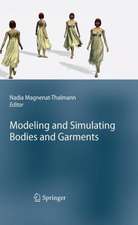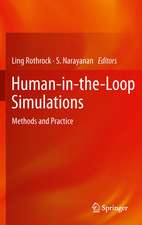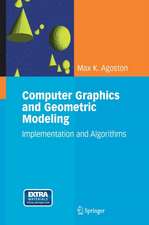Moving Targets: Elliott-Automation and the Dawn of the Computer Age in Britain, 1947 – 67: History of Computing
Autor Simon Lavingtonen Limba Engleză Paperback – 26 sep 2014
| Toate formatele și edițiile | Preț | Express |
|---|---|---|
| Paperback (1) | 1008.62 lei 6-8 săpt. | |
| SPRINGER LONDON – 26 sep 2014 | 1008.62 lei 6-8 săpt. | |
| Hardback (1) | 1016.38 lei 6-8 săpt. | |
| SPRINGER LONDON – 23 feb 2011 | 1016.38 lei 6-8 săpt. |
Din seria History of Computing
- 21%
 Preț: 248.72 lei
Preț: 248.72 lei - 20%
 Preț: 276.62 lei
Preț: 276.62 lei - 20%
 Preț: 440.22 lei
Preț: 440.22 lei - 20%
 Preț: 987.57 lei
Preț: 987.57 lei -
 Preț: 291.11 lei
Preț: 291.11 lei - 20%
 Preț: 224.97 lei
Preț: 224.97 lei -
 Preț: 253.85 lei
Preț: 253.85 lei -
 Preț: 294.37 lei
Preț: 294.37 lei -
 Preț: 326.35 lei
Preț: 326.35 lei - 20%
 Preț: 176.49 lei
Preț: 176.49 lei - 20%
 Preț: 270.51 lei
Preț: 270.51 lei - 20%
 Preț: 333.54 lei
Preț: 333.54 lei - 20%
 Preț: 764.76 lei
Preț: 764.76 lei - 20%
 Preț: 229.81 lei
Preț: 229.81 lei - 20%
 Preț: 273.64 lei
Preț: 273.64 lei - 20%
 Preț: 227.29 lei
Preț: 227.29 lei -
 Preț: 315.80 lei
Preț: 315.80 lei -
 Preț: 479.72 lei
Preț: 479.72 lei - 20%
 Preț: 235.56 lei
Preț: 235.56 lei - 20%
 Preț: 638.55 lei
Preț: 638.55 lei - 20%
 Preț: 216.00 lei
Preț: 216.00 lei - 20%
 Preț: 270.19 lei
Preț: 270.19 lei - 20%
 Preț: 983.71 lei
Preț: 983.71 lei - 20%
 Preț: 224.50 lei
Preț: 224.50 lei -
 Preț: 375.40 lei
Preț: 375.40 lei - 20%
 Preț: 1046.71 lei
Preț: 1046.71 lei - 20%
 Preț: 645.31 lei
Preț: 645.31 lei -
 Preț: 238.69 lei
Preț: 238.69 lei - 20%
 Preț: 360.71 lei
Preț: 360.71 lei - 20%
 Preț: 281.10 lei
Preț: 281.10 lei -
 Preț: 325.97 lei
Preț: 325.97 lei -
 Preț: 325.43 lei
Preț: 325.43 lei
Preț: 1008.62 lei
Preț vechi: 1260.78 lei
-20% Nou
Puncte Express: 1513
Preț estimativ în valută:
193.03€ • 200.78$ • 159.35£
193.03€ • 200.78$ • 159.35£
Carte tipărită la comandă
Livrare economică 14-28 aprilie
Preluare comenzi: 021 569.72.76
Specificații
ISBN-13: 9781447126362
ISBN-10: 144712636X
Pagini: 732
Ilustrații: XXI, 710 p.
Dimensiuni: 155 x 235 x 38 mm
Greutate: 1.01 kg
Ediția:2011
Editura: SPRINGER LONDON
Colecția Springer
Seria History of Computing
Locul publicării:London, United Kingdom
ISBN-10: 144712636X
Pagini: 732
Ilustrații: XXI, 710 p.
Dimensiuni: 155 x 235 x 38 mm
Greutate: 1.01 kg
Ediția:2011
Editura: SPRINGER LONDON
Colecția Springer
Seria History of Computing
Locul publicării:London, United Kingdom
Public țintă
ResearchCuprins
The Navy Comes to Borehamwood.- A Glint on the Horizon.- The Secret Digit.- Analogue Expertise.- NRDC and the Market.- Process Control and Automation: the Bagrit Vision.- Automation: the Machines and the Applications.- Software and Applications at Borehamwood.- NCR, the 405 and Commercial Data Processing.- Evolution of Elliott Computer Architectures.- EARS and Aerials: Elliott’s Radar Achievements.- Airborne Computing System Developments at Elliott-Automation, 1958 – 1988.- Mergers, Take-overs and Dispersals.- The End of the Line.
Recenzii
From the reviews:
“Moving Targets details the history of Elliott Brothers in 1947 through to the last vestige of those families of Elliott’s computers in GEC Computers in the 1990s. The title of the book Moving Targets is surely a reference to the recurring technical and marketing themes described by the book. … there is no doubt that the whole book is exceptionally well researched to a superb accuracy. … the book contains many interesting pictures.” (Roger Newey, Resurrection - The Bulletin of the Computer Conservation Society, Issue 55, Summer, 2011)
“This book focuses on making the history of computing more accessible to a wider audience by linking it to broader historical changes. … The text’s excellent tables, charts, and photos enhance the discussion of technological, economic, and political change. … the author is to be congratulated for a highly readable, wide-ranging account that shows the virtue of broad-based histories of computing that do not take the limitsof a specific industry or field of applications as their own.” (Marie Hicks, Technology and Culture, Vol. 53, July, 2012)
“In his latest book, Lavington scrutinizes the extensive work carried out by the employees of this company, and, thanks to his extensive efforts … . The book comprises 14 chapters and 11 appendices. … It is supported by extensive references, cited at the end of each chapter. … this erudite book should appeal to a wide readership, and Lavington should be highly commended for the sterling work that he has carried out in its preparation.” (Barry Blundell, ACM Computing Reviews, November, 2011)
“Moving Targets details the history of Elliott Brothers in 1947 through to the last vestige of those families of Elliott’s computers in GEC Computers in the 1990s. The title of the book Moving Targets is surely a reference to the recurring technical and marketing themes described by the book. … there is no doubt that the whole book is exceptionally well researched to a superb accuracy. … the book contains many interesting pictures.” (Roger Newey, Resurrection - The Bulletin of the Computer Conservation Society, Issue 55, Summer, 2011)
“This book focuses on making the history of computing more accessible to a wider audience by linking it to broader historical changes. … The text’s excellent tables, charts, and photos enhance the discussion of technological, economic, and political change. … the author is to be congratulated for a highly readable, wide-ranging account that shows the virtue of broad-based histories of computing that do not take the limitsof a specific industry or field of applications as their own.” (Marie Hicks, Technology and Culture, Vol. 53, July, 2012)
“In his latest book, Lavington scrutinizes the extensive work carried out by the employees of this company, and, thanks to his extensive efforts … . The book comprises 14 chapters and 11 appendices. … It is supported by extensive references, cited at the end of each chapter. … this erudite book should appeal to a wide readership, and Lavington should be highly commended for the sterling work that he has carried out in its preparation.” (Barry Blundell, ACM Computing Reviews, November, 2011)
Textul de pe ultima copertă
The Elliott-Automation company was an active participant in the birth of the information age in Britain. By 1961, the company was supplying 50% of the digital computers delivered to UK customers in that year. Yet by the end of that decade, Elliott-Automation had effectively disappeared in a flurry of takeovers, leaving little apparent trace of the technical excellence that had once characterised the name Elliott.
Moving Targetscharts the gradual take-up of information technology in Britain, as seen through the eyes of one innovative company. The book examines how the dawn of the digital computer age in Britain took place at various times for different applications, from early government-sponsored work on secret defence projects, to the growth of the market for Elliott computers for civil applications.
Topics and features:
Simon Lavington is Emeritus Professor of Computer Science at the University of Essex. Among his many publications is the book Early British Computers.
Moving Targetscharts the gradual take-up of information technology in Britain, as seen through the eyes of one innovative company. The book examines how the dawn of the digital computer age in Britain took place at various times for different applications, from early government-sponsored work on secret defence projects, to the growth of the market for Elliott computers for civil applications.
Topics and features:
- Charts the establishment of Elliott’s Borehamwood Research Laboratories in 1946, and the roles played by John Coales and Leon Bagrit in reviving an ailing company
- Examines early Elliott digital computers designed for classified military applications and for GCHQ, such as the Elliott 152, 153 and OEDIPUS
- Describes the analogue computers developed by Elliott-Automation, including the giant TRIDAC
- Reviews the development of the first commercial Elliott computers, the growth of applications in industrial automation, and the competition offered by rival manufacturers in Britain
- Includes a history of airborne computers up to 1988, written by a former director of Elliott Flight Automation
- Discusses the evolution of computer architectures and systems software for the Elliott 800, 900 and 4100 series computers
- Investigates the mergers, takeovers and eventual closure of the Borehamwood laboratories, and the demise of Elliott-Automation and its successors, ICL and GEC
Simon Lavington is Emeritus Professor of Computer Science at the University of Essex. Among his many publications is the book Early British Computers.
Caracteristici
Charts the gradual take-up of information technology in Britain, as seen through the eyes of one innovative company Examines how the dawn of the digital computer age in Britain took place at various times for different applications Includes a history of airborne computers up to 1988, written by a former director of Elliott Flight Automation Includes supplementary material: sn.pub/extras











